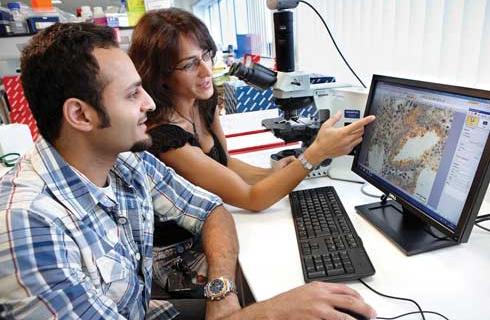国际学生入学条件
bachelor's degree (BA or BS) in nutrition, or a closely related field, from an accredited institution of higher learning
minimum GPA of 3.0
at least one undergraduate course in nutrition, human physiology, biochemistry, and statistics
GRE general test scores. No minimum score required
TOEFL iBT Test or IELTS Test. Foreign applicants must have a minimum TOEFL score of 100 iBT (600 paper, 250 computer) or IELTS score of 7.0
An interview is recommended for residents of Hawaii. A phone interview may be requested from out-of-state applicants.
展开
IDP—雅思考试联合主办方

雅思考试总分
7.0
- 雅思总分:7
- 托福网考总分:100
- 托福笔试总分:600
- 其他语言考试:NA
CRICOS代码:
申请截止日期: 请与IDP联系 以获取详细信息。
课程简介
Interest in nutrition, food, and its relationship to human health and fitness has never been greater or more exciting than it is today. The graduate program in Nutritional Sciences offers a master's degree that enables students to understand the scientific basis of nutrition, its application to health and fitness, and to learn research methods that further student knowledge of how food and nutrients relate to human health<br>Several subject areas of concentration include: nutritional biochemistry, nutritional epidemiology, diet and cancer, obesity, mineral nutrition and toxicology, dietary and functional fiber, community and international nutrition and much more<br>Cooperating programs include:<br>Animal Sciences, Food Sciences, Kinesiology and Leisure Science, Physiology, Public Health Sciences, the John A. Burns School of Medicine (JABSOM), and the Cancer Research Center of Hawaii (CRCH).<br>The learning objectives of the Nutritional Sciences graduate program are that students will:<br>Demonstrate mastery of fundamental knowledge in the field of nutrition<br>Demonstrate advanced scholarship in their specialty area in the field of nutrition<br>Communicate both orally and in writing at a high level of proficiency<br>Conduct and interpret nutritional research<br>Function as a professional in their chosen discipline area<br>Depending on the area of focus in their program of study, students are prepared for diverse careers in food and nutrition related industries, health-care and fitness facilities, nutrition education and communication enterprises, government food and nutrition agencies, or scientific research laboratories. Graduates have found employment as college instructors, nutrition educators or consultants in the private sector, nutritionists in the food industry, health-related government agencies, or fitness facilities, and as nutrition researchers in health-care industries and academic institutions. Many have gone on to pursue PhDs at major universities around the world.
展开







 预科
预科 奖学金
奖学金 实习机会
实习机会 在校学习
在校学习 跨境学习
跨境学习 校园授课-线上开始
校园授课-线上开始 在线/远程学习
在线/远程学习













 多伦多都会大学
多伦多都会大学

 多伦多都会大学
多伦多都会大学

 不列颠哥伦比亚大学
不列颠哥伦比亚大学

 多伦多大学
多伦多大学

 多伦多大学
多伦多大学

 多伦多大学
多伦多大学









 美国
美国
